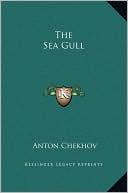

 |

|

The average rating for The Sea Gull based on 2 reviews is 3 stars.
Review # 1 was written on 2015-07-09 00:00:00 Robert Barger Robert BargerThis edition has a good, thorough, introduction as well as a very useful note on the translation. As Frayn puts it in the note on the translation knowing Russian and being a playwright is an advantage in translating Chekhov's plays, and who would have thought that - an amazing idea. Reading the plays for the first time in many years, the irony comes through very strongly, but maybe that's just one of the strengths of this translation which, in British English at least, comes across as easy and natural sounding. A difficulty in translating Chekhov, which Frayn explains very well in his note on the translation, is dealing with the politics of Imperial Russia, particularly with those student characters who have been kicked out or sent down for some kind of political offence or other. These kind of difficulties are perhaps, happily, insurmountable. The experience is too alien from our political reality. But perhaps without that political edge one is left only with the droll amusement of characters at rest and who don't work idolising the engagement and process of work which is crushing, absorbing and chewing up the other characters who can only dream of rest. Life goes on. |
Review # 2 was written on 2020-07-19 00:00:00 William Tew William TewDecember of Drama 2015, days 28-31 Let's tackle these one by one. Seagull "You feared a lonely death Like a lake leaves you alone in her depths." --bodyache, by Purity Ring So a lot of admirers of Chekhov praise him for his success in "direct" and "honest" drama, and his instigation of a new era or new forms in drama, and I'd agree with all that. But I think what's lost in the conversation is the content, the ideas he incorporated in the plays themselves. There is a personally resonant kind of pessimism that lurks between the lines, or comes right out in the open, and yes he probably owed a lot of this to Schopenhauer but all the same it seems to have been proved out by time. In some lines (see Cherry Orchard, below) he seems to bemoan the destruction of the environment, but in others he seems to long for the day when life has been extirpated from the earth and silence reigns. Hear, hear. Uncle Vanya "I feel guilty being alive While so many beautiful people have died I never thought that we wouldn't rule the world I always think we will I keep my fist clenched still." --Confetti, by Cold Cave In Seagull, you have the case of Chekhov's Gun being used to successfully end a life. Here, it just goes off, and the person apparently misses. And as the introduction attributes a quote to a Russian director: "Uncle Vanya is an American play," because you have a family gathering for the holidays, bickering, a gunshot, then everyone going off more or less reconciled. It also follows a pattern that emerges in these four "major" plays, in that some kind of violence punctuates the drama in the final act. This isn't revolutionary of course, and I know that some others call Chekhov's stuff boring or depressing, but if you know what to look for there's a definite tension the whole time, steadily rising until the climax. I happen to really enjoy his plays, I've discovered-- their style, structure, and content. Three Sisters "Home, is where I want to be But I guess I'm already there." --This Must Be the Place (Naive Melody), by Talking Heads Olga, Masha and Irina. There, see, I can name them! Aside from that, this play didn't leave too much of an impression, although I could recognize that the "violent climax" pattern repeated in the form of an out-of-control fire, and also a duel that kills off a potential suitor, who was going to sweep one of the sisters away and provide some direction to her life. All of the sisters seem to be struggling with that, an aimlessness or insecurity about their choices. Cherry Orchard "Don't look ahead, there's stormy weather Another roadblock in our way But if we go, we go together Our hands are tied here if we stay." --Disparate Youth, by Santigold This one affects me the most. I'm fairly sure I read it before, because the revelation (and the resolution) at the end seemed very familiar. I can picture Russian audiences in tears at the end, because even I come close to that. It dramatizes a pain we've all experienced, and captures perfectly both the dread and joy in letting go of something. In other words, it's really about the power of time, its dual capacity to destroy and renew. Every day we are losing something we can never regain. If the final act of this doesn't affect you, your heart is probably made of stone. Final thoughts: Chekhov is great. He created drama out of true-to-life moments, only to occasionally pull the veil and address those unspoken truths that lie beneath. And this edition is brilliant, for the positioning of the plays themselves, as well as the notes. I can't speak to the quality of the translation but I'd recommend this volume to anyone into Russian literature. |
CAN'T FIND WHAT YOU'RE LOOKING FOR? CLICK HERE!!!